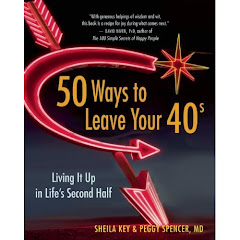Monday, November 15, 2010
Monday, October 25, 2010
Tuesday, October 19, 2010
Saturday, July 17, 2010
Consider NOT Considering the Source
Consider the source.
That is one of those truisms for critical thinking we learned in college. Before you accept something you hear or read as truth with a capital T, look at who is saying it, and decide if they are worth listening to or not. Is this person an expert? Is this article peer-reviewed? Was the study double-blinded? Could this person be biased? Do I even like this guy?
It's a good idea, to an extent, but I submit it can get carried too far. Do you ever consider the source before you listen to what they have to say? I know I do. Oh, that guy is a Republican. I know I won't agree with him. Her? She said something nasty and untrue to my friend the other day. I know I won't believe a word she says. My husband? I'm pissed at him for something he did this morning, so anything he says today I'll take personally.
The thing is, if you filter stuff before it even gets to your brain, like this, you can miss out on a lot of good information. That Republican guy might have something reasonable to say about the gulf oil spill. The nasty gal might have just been on the rag the other day and have a great tip for sale dresses today. My husband making an observation about my behavior might just be right (I cringe to admit).
I've been practicing NOT considering the source. Try evaluating the message on its own merits. Forget the messenger. Whether it be someone's take on current events or feedback on how I come across, I'm trying a "just the facts, ma'am" approach. Is the message valid, interesting, worth considering? If so, it doesn't matter where it came from. I can learn from the message, even if I'm too biased to learn from the messenger.
If the message is worthless, let it go. Push the eject button and get it out of my mind. Easier said than done, but worth a try.
That is one of those truisms for critical thinking we learned in college. Before you accept something you hear or read as truth with a capital T, look at who is saying it, and decide if they are worth listening to or not. Is this person an expert? Is this article peer-reviewed? Was the study double-blinded? Could this person be biased? Do I even like this guy?
It's a good idea, to an extent, but I submit it can get carried too far. Do you ever consider the source before you listen to what they have to say? I know I do. Oh, that guy is a Republican. I know I won't agree with him. Her? She said something nasty and untrue to my friend the other day. I know I won't believe a word she says. My husband? I'm pissed at him for something he did this morning, so anything he says today I'll take personally.
The thing is, if you filter stuff before it even gets to your brain, like this, you can miss out on a lot of good information. That Republican guy might have something reasonable to say about the gulf oil spill. The nasty gal might have just been on the rag the other day and have a great tip for sale dresses today. My husband making an observation about my behavior might just be right (I cringe to admit).
I've been practicing NOT considering the source. Try evaluating the message on its own merits. Forget the messenger. Whether it be someone's take on current events or feedback on how I come across, I'm trying a "just the facts, ma'am" approach. Is the message valid, interesting, worth considering? If so, it doesn't matter where it came from. I can learn from the message, even if I'm too biased to learn from the messenger.
If the message is worthless, let it go. Push the eject button and get it out of my mind. Easier said than done, but worth a try.
Tuesday, January 19, 2010
Saturday, January 16, 2010
"Did you kill anyone over there?"
This is one question it is NOT okay to ask an Iraq war veteran. I know this, although I've never been exactly sure why. Best I could figure, it is because a) that is an intensely personal question, kind of like asking a stranger if they've ever had an abortion and b) because the answer is most likely "yes" and I should know that and they probably don't want to talk about the war.
Recently I have become acquainted with an army veteran of some thirteen years, multiple continents and numerous conflicts, including Afghanistan and Iraq. Thanks to his courage to look within and work hard, he has done a lot of healing from the inevitable psychic wounds of war, and thanks to his generosity in sharing, I am learning a lot from him.
I asked this vet why the question is so taboo. He explained that, during the conduct of war, you have to do things that, in our civilian society, are unacceptable. In peacetime, killing another human being is murder, and it's wrong. In war, it is the business of war. You do it because you have to, because they are the enemy. You kill people, you see people killed, you witness horrible destruction and suffering. It is what you do in combat, yet part of you whispers that if you're doing this, you must be a bad person. Sometimes, that part becomes convinced.
When you come home, you put those things, the events of war you have lived through, into a fragile compartment in your mind and protect it carefully.
If you try to answer the question, "Did you kill anyone?," all of a sudden you are forced to dig into your mind, expose that fragile compartment, and relive it. Whether you have personally killed anyone or not, you have been at war. You have participated in the conduct of combat and now you have to look at yourself in the mirror. You want to be a good person, you try to convince yourself that you are a good person, but when you see again the scenes of combat and feel the contamination of war's aftermath, you feel like a bad person. The conflict is excruciating.
I have never, thank goodness, asked a vet that question. Now I'm sure I never will.
Recently I have become acquainted with an army veteran of some thirteen years, multiple continents and numerous conflicts, including Afghanistan and Iraq. Thanks to his courage to look within and work hard, he has done a lot of healing from the inevitable psychic wounds of war, and thanks to his generosity in sharing, I am learning a lot from him.
I asked this vet why the question is so taboo. He explained that, during the conduct of war, you have to do things that, in our civilian society, are unacceptable. In peacetime, killing another human being is murder, and it's wrong. In war, it is the business of war. You do it because you have to, because they are the enemy. You kill people, you see people killed, you witness horrible destruction and suffering. It is what you do in combat, yet part of you whispers that if you're doing this, you must be a bad person. Sometimes, that part becomes convinced.
When you come home, you put those things, the events of war you have lived through, into a fragile compartment in your mind and protect it carefully.
If you try to answer the question, "Did you kill anyone?," all of a sudden you are forced to dig into your mind, expose that fragile compartment, and relive it. Whether you have personally killed anyone or not, you have been at war. You have participated in the conduct of combat and now you have to look at yourself in the mirror. You want to be a good person, you try to convince yourself that you are a good person, but when you see again the scenes of combat and feel the contamination of war's aftermath, you feel like a bad person. The conflict is excruciating.
I have never, thank goodness, asked a vet that question. Now I'm sure I never will.
Thursday, January 14, 2010
A paid writing gig hits the 'net.
Here is an article I wrote for My Family Doctor, a magazine that recently went paperless.
Subscribe to:
Posts (Atom)



